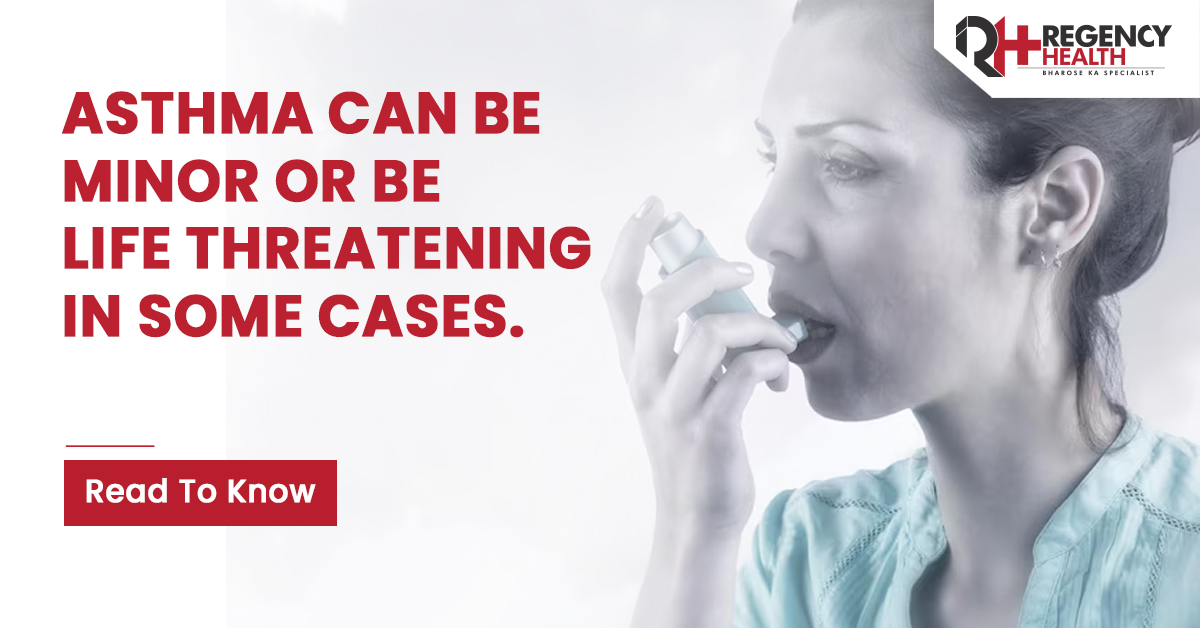
What is Asthma?
Asthma is a chronic respiratory condition suffered by millions of individuals worldwide. It is characterised by inflammation and narrowing of the airways, leading to recurring episodes of breathlessness, wheezing, coughing, and chest tightness. This blog aims to provide a comprehensive overview of asthma, including the types of asthma, its causes, asthma symptoms, diagnosis, and available asthma treatment options.
Types of Asthma
- Allergic Asthma
This type of asthma is triggered by allergens such as pollen, dust mites, pet dander, or mould spores. It is the most common form of asthma and often develops in childhood.
- Non-Allergic Asthma
Non-allergic asthma is not triggered by allergens. This can be caused by factors like exercise, cold air, respiratory infections, stress, or irritants such as smoke or strong odours.
- Occupational Asthma
This type of asthma is specifically triggered by substances present in the workplace, such as chemicals, dust, or fumes. It may develop or worsen after exposure to these substances over time.
- Exercise-induced bronchoconstriction (EIB)
This typically strikes people a few minutes after they begin exercising and can last for up to 10 to 15 minutes. 90% of people with asthma usually experience EIB.
- Aspirin-induced Asthma (AIA)
This type of asthma is typically quite severe. It is caused due to consumption of aspirin or another NSAID, such as naproxen (Aleve) or ibuprofen (Advil). The symptoms could appear minutes or hours later.
AIA is experienced by around 9% of asthmatics. In people between the ages of 20 and 50, it typically appears out of nowhere.
- Nocturnal Asthma
The symptoms of this kind of asthma get worse at night.
The following triggers are thought to cause symptoms at night:
- heartburn
- pet dander
- dust mites
- Cough-variant Asthma (CVA)
Shortness of breath and wheezing are not common symptoms of CVA. It is distinguished by a chronic, dry cough.
Untreated CVA can result in full-blown asthma flare-ups with the other more typical symptoms.
Causes of Asthma
The exact causes of asthma are not fully understood, but it is believed to result from a combination of genetic and environmental factors. Some common contributing factors include:
Genetic Predisposition: Asthma tends to run in families, suggesting a genetic component. People are more likely to develop the illness if they have a family history of allergies or asthma.
Environmental Triggers: Exposure to certain allergens, irritants, and respiratory infections can trigger or exacerbate asthma symptoms. These triggers may include pollen, dust mites, pet dander, air pollution, tobacco smoke, cold air, and viral respiratory infections.
History of viral infections: People may be more prone to acquire asthma if they had a history of severe viral infections during early childhood, such as respiratory syncytial virus infection (RSV).
Symptoms of Asthma
The severity and frequency of asthma symptoms can differ from person to person. Common signs and symptoms include:
- Wheezing
- Shortness of Breath
- Coughing
- Chest Pain or Tightness
- Difficulty Talking
- Anxiousness or panic
- Fatigue
- Rapid Breathing
- Frequent Infections
- Trouble Sleeping
Diagnosis of Asthma
To diagnose asthma, healthcare professionals consider several factors, including:
Medical History: Discussing symptoms, triggers, and family history of asthma or allergies.
Physical Examination: Check for wheezing or other abnormal sounds.
Lung Function Tests: Spirometry is a common test used to measure how much air you can exhale forcefully and how quickly you can do it. It helps assess lung function and diagnose asthma.
Allergy Testing: Skin or blood tests may be conducted to identify specific allergens that trigger asthma symptoms.
Treatment of Asthma
Asthma cannot be cured, but it can be effectively managed with appropriate treatment. The treatment plan for asthma prevention may include:
Inhalers: The mainstay of asthma treatment, inhalers deliver medication directly to the lungs, providing quick relief or long-term control. There are two types of inhalers: relievers (for immediate symptom relief) and preventers (to reduce inflammation and prevent symptoms).
Allergy Management: Identifying and avoiding allergens that trigger asthma symptoms is essential. This may involve making changes to the living environment or taking allergy medications.
Asthma Medications: Besides inhalers, oral medications such as corticosteroids or leukotriene modifiers may be prescribed to control asthma symptoms and reduce inflammation.
Key Takeaways
Breathing becomes challenging due to the inflammation of the lungs caused by asthma.
It can have an impact on both adults and children in various ways and to varying degrees of severity.
A change in lifestyle may also lessen asthma attacks. Changes in diet, exercise, or stress reduction may be part of this. To find out what sort of asthma you could have and the best management choices for you, consult with your doctor.

 Call-an-Ambulance
Call-an-Ambulance



